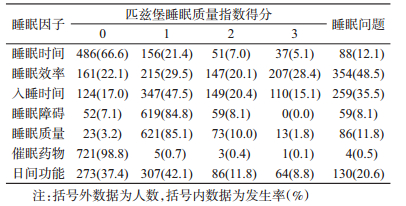文章信息
- 姚尧, 甯超学, 陈小萍, 朱乔, 杨姗姗, 曾倩, 张福, 栾复新, 何耀, 赵亚力.
- Yao Yao, Ning Chaoxue, Chen Xiaoping, Zhu Qiao, Yang Shanshan, Zeng Qian, Zhang Fu, Luan Fuxin, He Yao, Zhao Yali.
- 海南省百岁老年人睡眠质量及其影响因素研究
- Study on sleep quality and related determinants among centenarians in Hainan province
- 中华流行病学杂志, 2018, 39(4): 460-463
- Chinese Journal of Epidemiology, 2018, 39(4): 460-463
- http://dx.doi.org/10.3760/cma.j.issn.0254-6450.2018.04.014
-
文章历史
收稿日期: 2017-08-20
2. 572000 三亚, 中国人民解放军总医院海南分院中心实验室
2. Central Laboratory, Hainan Branch of PLA General Hospital, Sanya 572000, China Yao Yao and Ning Chaoxue are the first authors who contributed equally to the article
睡眠质量已成为衡量老年人群健康水平和生活质量的重要指标[1]。随着年龄的增加,老年人群睡眠的质和量逐渐下降,睡眠问题也逐渐增多。老年人的睡眠质量下降不仅影响生活质量,还可增加跌倒、肥胖、认知功能障碍和心脑血管疾病等常见慢性病发病风险[2-6]。国内外已有较多对普通老年人群睡眠障碍患病情况及影响因素的研究,但是针对百岁老年人群的研究尚不足[7-8]。本文对海南省16个市县730名百岁老年人进行横断面入户调查,了解百岁老年人群睡眠质量情况及其影响因素。
对象与方法1.调查对象:根据海南省民政厅提供百岁老年人名单,2014年6月至2016年6月对海口、三亚、万宁、琼海、文昌、乐东、东方、陵水、五指山、保亭、白沙、琼中、昌江、定安、屯昌、澄迈16个市(县)百岁老年人进行全样本入户调查,排除死亡、无法联系、未通过年龄核验、老年人或家属不配合检查者,共计走访调查百岁老年人840人,具体研究设计及方案见参考文献[9]。进一步剔除数据资料不全者,最终730名百岁老年人纳入研究。调查对象均签署知情同意书。本研究通过解放军总医院伦理委员会审查。
2.调查内容:采取面对面访谈法采集基本资料,如本人无法完成全部内容者,由直系家属或主要照顾者补充。问卷调查包括一般人口学特征(年龄、性别、文化程度、婚姻状况、民族)、主要疾病(自我报告心脏病和高血压)、疼痛(持续时间超过1个月)、生活习惯(目前是否吸烟、饮酒,饮食是否规律,是否有午睡习惯)、锻炼情况(每周>30 min轻度体力活动次数)及居住环境(安静或嘈杂)自评等。
3.指标定义及评价标准:匹兹堡睡眠质量指数(Pittsburgh sleep quality index,PSQI)主要包括睡眠效率、有无睡眠障碍、睡眠药物的使用情况以及日间功能等内容,通过总分反映被试者的睡眠质量[10]。PSQI在国外是睡眠研究和精神科临床评定的常用量表,且国内研究已证明在我国人群睡眠质量评定中有较好的信度和效度[11]。该量表18个计分条目组成7个成分,每个成分按等级计0~3分,2~3分为该条目睡眠水平差;累积7条目得分为PSQI总分(0~21),总分≤7分为睡眠质量好,得分越高表示睡眠质量越差。
4.统计学分析:数据经EpiData 3.1软件双平行录入,采用SPSS 20.0统计软件进行数据分析。计量资料以x±s表示,计数资料使用例数百分比描述。计量资料和计数资料的比较分别采用t检验和χ2检验。采用多因素logistic回归模型分析影响睡眠质量的主要因素。P<0.05为差异有统计学意义。
结果1.一般情况:730名百岁老年人,年龄(102.5±2.7)岁。女性(83.4%)、文盲(90.1%)、丧偶(87.5%)、汉族(82.7%)占大多数。其中225例(30.8%)存在睡眠障碍,其中文盲、患心脏病、大小便失禁、身体持续疼痛、饮食不规律、无午睡习惯、看电视的比率高于睡眠质量正常组,差异有统计学意义(P<0.05),见表 1。
2.主要睡眠问题:PSQI得分(6.44±3.05)分。各条目达到2分或3分被认为睡眠存在问题,存在主要睡眠问题为睡眠效率低(48.5%),入睡时间≥30 min(35.5%)和日间功能障碍(20.6%),见表 2。
3.睡眠质量影响因素:将睡眠质量作为因变量(障碍=1,良好=2),表 1中相关因素作为自变量纳入多因素logistic回归模型。结果显示大小便失禁、心脏病、身体持续疼痛、午睡习惯和规律饮食是影响百岁老年人睡眠质量的主要影响因素(P<0.05),其中大小便失禁(OR=2.30,95%CI:1.36~3.89,P=0.002)、心脏病(OR=2.19,95%CI:1.01~4.79,P=0.048)、身体持续疼痛(OR=2.65,95%CI:1.87~3.73,P<0.001)是百岁老年人发生睡眠障碍的危险因素;而午睡习惯(OR=0.53,95%CI:0.34~0.83,P=0.005)和规律饮食(OR=0.49,95%CI:0.24~0.99,P=0.048)是睡眠质量障碍的保护因素。
讨论本研究中730名百岁老年人有30.8%存在睡眠障碍,主要为睡眠效率低、入睡时间长和日间功能障碍。该人群睡眠障碍的危险因素有大小便失禁、心脏病、身体持续疼痛,而保护性因素有午睡习惯和饮食规律。本文睡眠障碍发生率低于我国济南地区(39.4%)[12]和意大利罗马(35.2%)[13]百岁老年人睡眠障碍的调查;另有研究显示,≥60岁老年人群睡眠障碍患病率为36%~69%[14-15]。本文PSQI得分(6.44±3.05)分,低于其他百岁及高龄老年人睡眠质量研究报道[7, 16]。
对睡眠质量各因子分析发现,百岁老年人主要存在睡眠问题为睡眠效率低、入睡时间长和日间功能障碍。该结果与之前研究相似,睡眠效率低与入睡时间长是老年人群睡眠障碍主要问题[6]。其他研究发现老年人群服用催眠药物率较高[6],而本文仅1.2%的百岁老年人服用催眠药物。
多因素logistic回归分析显示,百岁老年人饮食规律者睡眠质量较好,而不规律饮食会影响老年人睡眠质量[17]。84.1%百岁老年人有午睡习惯,按时午休,保持良好的午休习惯能够提高老年人睡眠质量,与国内外研究结果一致[18-20]。大小便失禁是影响百岁老年人睡眠质量的危险因素,与张家煦等[16]的结果一致。患心脏病的老年人睡眠障碍患病率高于无心脏病者(OR=2.19,95%CI:1.01~4.79),与国内老年人睡眠质量影响因素Meta分析结果(OR=1.94,95%CI:1.54~2.44)相似[21],可能因为疾病引起的疼痛不适影响睡眠质量,同时服用某些药物也可能影响睡眠质量;身体持续疼痛与老年人睡眠质量障碍相关与李杰等[22]研究结果一致;国内其他研究证实,缓解疼痛有利于改善老年人睡眠质量[23]。
本研究存在局限性。如研究为横断面设计,结果仅提示相关,具体因果联系需要进一步前瞻性研究验证;未能分析焦虑、抑郁等心理、精神因素对睡眠质量障碍的影响,可能忽略这些因素对其他影响因素的混杂作用。
综上所述,海南省百岁老年人睡眠质量障碍患病率较低,严重影响因素为大小便失禁、心脏病、身体持续疼痛、午睡习惯和规律饮食等,应针对影响百岁老年人睡眠质量的相关因素进行干预。
利益冲突: 无
| [1] | Woodward M. Sleep in older people[J]. Rev Clin Gerontol, 2012, 22(2): 130–149. DOI:10.1017/S0959259811000232 |
| [2] | Devore E, Grodstein F, Schernhammer E. Sleep duration and cognitive function:the nurses' health study[J]. Alzheimer's & Dementia, 2012, 8(Suppl 4): 233. DOI:10.1016/j.jalz.2012.05.616 |
| [3] |
王敬兰. 老年人睡眠障碍原因分析进展[J]. 中国老年学, 2012, 32(1): 212–213.
Wang JL. Review on factors of elderly sleep disorder[J]. Chin J Gerontol, 2012, 32(1): 212–213. DOI:10.3969/j.issn.1005-9202.2012.01.105 |
| [4] | Haseli-Mashhadi N, Dadd T, Pan A, et al. Sleep quality in middle-aged and elderly Chinese:distribution, associated factors and associations with cardio-metabolic risk factors[J]. BMC Public Health, 2009, 9(1): 130. DOI:10.1186/1471-2458-9-130 |
| [5] | Stone KL, Blackwell TL, Ancoli-Israel S, et al. Sleep disturbances and risk of falls in older community-dwelling men:the outcomes of Sleep Disorders in Older Men (MrOS Sleep) Study[J]. J Am Geriatr Soc, 2014, 62(2): 299–305. DOI:10.1111/jgs.12649 |
| [6] |
曾静, 刘淼, 汤如, 等. 老年男性人群睡眠质量调查及影响因素分析[J]. 中国临床保健杂志, 2016, 19(6): 561–564.
Zeng J, Liu M, Tang R, et al. Analysis of sleep quality and its influence factors in the elderly males with physical examination[J]. Chin J Clin Healthcare, 2016, 19(6): 561–564. DOI:10.3969/j.issn.1672-6790.2016.06.001 |
| [7] | Gu DN, Sautter J, Pipkin R, et al. Sociodemographic and health correlates of sleep quality and duration among very old Chinese[J]. Sleep, 2010, 33(5): 601–610. |
| [8] |
石文惠, 何柳, 翟屹, 等. 386名百岁老年人睡眠质量调查分析[J]. 中国慢性病预防与控制, 2013, 21(5): 593–594.
Shi WH, He L, Zhai Y, et al. Analyses on sleep quality of 386 centenarians[J]. Chin J Prev Control Chro Dis, 2013, 21(5): 593–594. DOI:10.16386/j.cjpccd.issn.1004-6194.2013.05.003 |
| [9] |
何耀, 栾复新, 姚尧, 等. 中国海南百岁老人队列研究:研究设计及初步结果[J]. 中华流行病学杂志, 2017, 38(9): 1292–1298.
He Y, Luan FX, Yao Y, et al. China Hainan Centenarian Cohort Study:study design and preliminary results[J]. Chin J Epidemiol, 2017, 38(9): 1292–1298. DOI:10.3760/cma.j.issn.0254-6450.2017.09.029 |
| [10] | Buysse DJ, Reynolds CF, Monk TH, et al. The Pittsburgh Sleep Quality Index:a new instrument for psychiatric practice and research[J]. Psychiatry Res, 1989, 28(2): 193–213. DOI:10.1016/0165-1781(89)90047-4 |
| [11] |
刘贤臣, 唐茂芹, 胡蕾, 等. 匹兹堡睡眠质量指数的信度和效度研究[J]. 中华精神科杂志, 1996, 29(2): 103–107.
Liu XC, Tang MQ, Hu L, et al. Reliability and validity of the Pittsburgh sleep quality index[J]. Chin J Psych, 1996, 29(2): 103–107. |
| [12] |
闫志晖, 赵子彦, 付越榕. 百岁老人睡眠状况调查及相关因素分析[C]//2009全国时间生物医学学术会议论文集. 黄山: 中国中西医结合学会, 2009.
Yan ZH, Zhao ZY, Fu YR. Sleep quality and determinants of centenarians[C]//Symposium of Chinese Timing Biomedical Academic Congress. Huangshan: Chinese Association of Integrative Medicine, 2009. http://cpfd.cnki.com.cn/Article/CPFDTOTAL-ZGZP200904003030.htm |
| [13] | Tafaro L, Cicconetti P, Baratta A, et al. Sleep quality of centenarians:cognitive and survival implications[J]. Arch Gerontol Geriat, 2007, 44(Suppl 1): 385–389. DOI:10.1016/j.archger.2007.01.054 |
| [14] |
刘芸, 董永海, 李晓云, 等. 中国60岁以上老年人睡眠障碍患病率的Meta分析[J]. 现代预防医学, 2014, 41(8): 1442–1445, 1449.
Liu Y, Dong YH, Li XY, et al. Meta-analysis of the prevalence of sleep disorder among Chinese elderly aged 60 years and over[J]. Mod Prev Med, 2014, 41(8): 1442–1445, 1449. |
| [15] | Foley D, Ancoli-Israel S, Britz P, et al. Sleep disturbances and chronic disease in older adults:Results of the 2003 National Sleep Foundation Sleep in America Survey[J]. J Psychosomat Res, 2004, 56(5): 497–502. DOI:10.1016/j.jpsychores.2004.02.010 |
| [16] |
张家煦, 刘娜, 陈国良, 等. 社区后期高龄老人睡眠质量及其相关因素分析[J]. 中华保健医学杂志, 2014, 4(2): 94–97.
Zhang JX, Liu N, Chen GL, et al. Sleep quality in community elderhood elderly people and related factors[J]. Chin J Health Care Med, 2014, 4(2): 94–97. DOI:10.3969/j.issn.1674-3245.2014.02.005 |
| [17] |
叶猛飞, 丁春丽, 俞瑶瑶, 等. 浙江省农村老年人睡眠质量及其影响因素[J]. 中国老年学杂志, 2016, 3(5): 1183–1185.
Ye MF, Ding CL, Yu YY, et al. Sleep quality and risk factors of the rural elderly in Zhejiang Province[J]. Chin J Gerontol, 2016, 3(5): 1183–1185. DOI:10.3969/j.issn.1005-9202.2016.05.073 |
| [18] |
刘海娟, 陈长香, 郝习君, 等. 老年人睡眠障碍及其影响因素[J]. 中国老年学杂志, 2010, 30(15): 2198–2200.
Liu HJ, Chen CX, Hao XJ, et al. Sleep disorder and determinants of older adults[J]. Chin J Gerontol, 2010, 30(15): 2198–2200. DOI:10.3969/j.issn.1005-9202.2010.15.051 |
| [19] |
曲晓婷, 曹鸣蕊, 李晓波, 等. 老年人睡眠质量及其影响因素[J]. 中国老年学杂志, 2011, 3(5): 852–853.
Qu XT, Cao MR, Li XB, et al. Sleep quality and its determinants of older adults[J]. Chin J Gerontol, 2011, 3(5): 852–853. DOI:10.3969/j.issn.1005-9202.2011.05.054 |
| [20] | Vitiello MV. Sleep in normal aging[J]. Sleep Med Clin, 2006, 1(2): 171–176. DOI:10.1016/j.jsmc.2006.04.007 |
| [21] |
曾静, 刘淼, 吴蕾, 等. 中国社区老年人睡眠质量影响因素的系统评价[J]. 中华流行病学杂志, 2016, 37(12): 1670–1677.
Zeng J, Liu M, Wu L, et al. A systematic review and Meta-analysis on influencing factors related to the quality of sleep among community population aged 60 and older, in China[J]. Chin J Epidemiol, 2016, 37(12): 1670–1677. DOI:10.3760/cma.j.issn.0254-6450.2016.12.022 |
| [22] |
李杰, 董青, 刘娟娟, 等. 安徽省农村老年人睡眠与生活质量现况调查[J]. 中华流行病学杂志, 2010, 31(4): 405–408.
Li J, Dong Q, Liu JJ, et al. Sleep and quality of life among rural elderly in Anhui province[J]. Chin J Epidemiol, 2010, 31(4): 405–408. DOI:10.3760/cma.j.issn.0254-6450.2010.04.010 |
| [23] |
姚美, 宋志雪, 陈长香, 等. 综合干预对骨质疏松老年人疼痛及睡眠质量的影响[J]. 中国骨质疏松杂志, 2016, 22(12): 1551–1555.
Yao M, Song ZX, Chen CX, et al. The effect of comprehensive intervention on pain and sleep quality among the elderly with osteoporosis[J]. Chin J Osteoporosis, 2016, 22(12): 1551–1555. DOI:10.3969/j.issn.1006-7108.2016.12.011 |
 2018, Vol. 39
2018, Vol. 39




